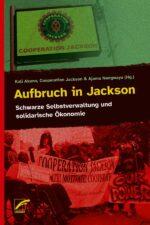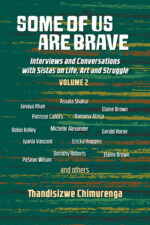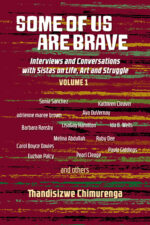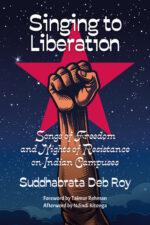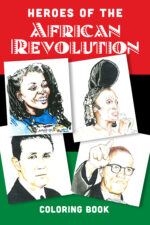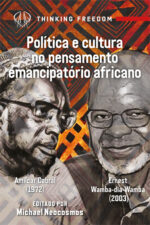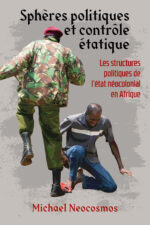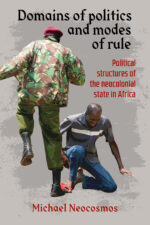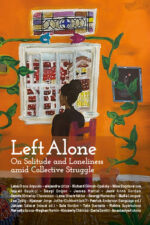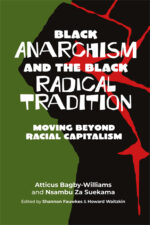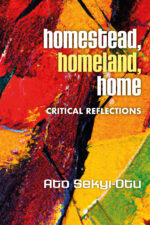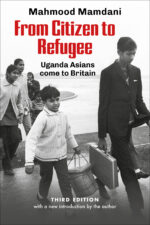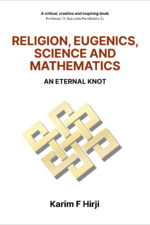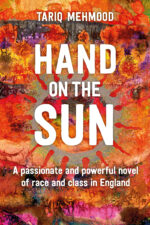-
Aufbruch in Jackson [German edition of Jackson Rising: Black self-management and solidarity economy]
USD $ 24.00German translation of Jackson Rising: The Struggle for Economic Democracy and Black Self-Determination in Jackson, MississippiHow black activists are building liberation practically from below: Departure in Jackson documents the history of one of the most exciting revolutionary experiments in the USA Present.
Since the 1970s, black liberation movements in majority-black Mississippi have taken change into their own hands. The Deep South should become the center of their independence – “Free the Land!” In the 2010s, the election of Chokwe Lumumba as mayor in the capital Jackson took an important step towards implementing the vision of assembly democracy, solidarity economy and an end to racial inequality. Lumumba dies unexpectedly in 2014, but his son Antar and the Cooperation Jackson continue to move forward.
We learn about the pitfalls of radical local politics and struggles for housing and land, democratic economic models and ecology, internationalist solidarity and the parallels to the Rojava Revolution and the Zapatistas, about encouraging experiences in which different concerns go hand in hand.
-
“Not Bad for a N—, No?” / «Pas mal pour un N—, n’est-ce pas? »
Written during the seventy-fifth anniversary celebrations of the publication of Frantz Fanon’s Peau noir, masques blancs (“Black Skin, White Masks”), “Not Bad for a N—, No?” offers reflections on the circumstances of the publication of this classic work with Fanon’s insights on what he called the attempted “murder of man” and the urgent need for humanity to become “actional.”
Écrit lors des célébrations du soixante-quinzième anniversaire de la publication de Frantz Fanon de Peau noir masques blancs, «Pas mal pour un N—, n’est-ce pas? » offre des réflexions sur les circonstances de la publication de cette œuvre classique avec les idées de Fanon sur ce qu’il a appelé la tentative de «meurtre de l’homme» et le besoin urgent que l’humanité devienne «actionnelle».
-
Política e cultura no pensamento emancipatório africano
A atual ausência de uma visão emancipatória para a África está no centro dos nossos problemas políticos relacionados à opressão racial capitalista e colonial. Qualquer tentativa de repensar a emancipação política no continente africano deve ser capaz de localizar uma concepção universal de liberdade no interior das experiências culturais singulares que as pessoas vivem. Quando esteve baseada nas tradições populares, a política emancipatória exibiu tais traços dialéticos, independentemente da maneira específica na qual cada luta pela liberdade foi pensada em diferentes contextos históricos. No entanto, apenas alguns intelectuais militantes compreenderam a importância dessa dialética no pensamento. O presente volume esboça e discute dois pontos de vista particularmente importantes sobre o papel e a relevância da cultura popular na política emancipatória em África. Cada um deles resulta de formas distintas de exploração capitalista e colonialista: o primeiro viu a luz do dia em um contexto colonial, enquanto o segundo é diretamente confrontado pelo estado neocolonial. Todas as políticas emancipatórias são desenvolvidas em confronto com o poder estatal, e todas começam com um processo de discussão e debate através do qual um sujeito coletivo começa a se formar. No continente africano, a construção de tal sujeito político coletivo tem sido informada, de maneira fundamental, pelas culturas populares. Os dois autores cujos ensaios estão aqui incluídos entenderam isso e colocaram a cultura popular no centro de suas políticas. O primeiro, Amílcar Cabral, aborda o papel central da cultura popular na luta pela independência da Guiné-Bissau nos anos 1970; o segundo, Ernest Wamba-dia-Wamba, aborda a centralidade da cultura popular africana para uma política emancipatória endereçada à atual República Democrática do Congo. Apesar das décadas que os separam, tanto Cabral como Wamba-dia-Wamba desenvolvem, no centro de sua política, uma dialética que ativa os universais da cultura no presente. É essa característica que confere às suas visões uma importância central para o pensamento emancipatório contemporâneo.
-
Politique et culture dans la pensée émancipatrice Africaine
Au cœur de nos problèmes politiques issus d’un capitalisme racial et d’une oppression (néo)coloniale en Afrique aujourd’hui se trouve l’absence de toute vision émancipatrice véritable. Toute tentative de repenser une politique émancipatrice en Afrique doit pouvoir situer une vision universaliste de la liberté parmi les expériences culturelles singulières que les gens vivent. Les politiques émancipatrices quand elles existaient, bien que pensées dans les luttes pour la liberté ayant lieu dans des contextes historiques particuliers, mettaient toujours en vue une dialectique de ce genre quand elles étaient vraiment basées parmi les traditions populaires. Cependant, seulement une minorité de dirigeants intellectuels et militants comprenait l’importance d’une telle dialectique pour la pensée et l’action.
Ce petit livre trace le contour et discute de deux points de vue très importants sur le rôle de la culture populaire dans la politique émancipatrice en Afrique. Chacun d’entre eux émane de formes d’exploitation capitalistes coloniales distinctes : le premier a vu le jour dans un contexte colonial classique tandis que le second est directement issu d’un contexte étatique néocolonial. Toute politique émancipatrice est développée vis-à-vis le pouvoir d’état et toutes commencent avec un processus de discussion ou est formé un sujet collectif. Un tel sujet politique doit être fondamentalement informé par et conçu en relation avec les cultures populaires.
Les deux auteurs ci-inclus ont compris ce principe et mettent la culture populaire au centre de leur pensées politiques. Le premier, Amílcar Cabral se réfère au rôle principal de la culture dans la lutte contre le colonialisme au Guinée Bissau dans les années 1970 ; le second, Ernest Wamba-dia-Wamba insiste sur le rôle central de la culture populaire pour une politique émancipatrice dans la République Démocratique du Congo aujourd’hui. Malgré la distance temporelle qui les sépare, tous les deux développent au centre de leurs politiques distinctes, une pensée dialectique qui déclenche des pensées universalistes depuis la culture populaire dans le présent. C’est pour cela que leurs points de vue sont d’une importance capitale pour la pensée de la politique émancipatrice en Afrique aujourd’hui.
-
Sphères politiques et contrôle étatique : Les structures politiques de l’état néocolonial en Afrique
USD $ 10.00Il s’agit d’une brève tentative d’orienter l’étude de l’État néocolonial en Afrique à travers une évaluation de la manière dont il gouverne son peuple. On soutient que l’État produit différents modes de contrôle étatique en déployant différentes politiques sur différentes parties de la population. De cette manière, il peut combiner une règle véritablement démocratique à l’image de l’Occident sur certains tout en soumettant la majorité à des formes coloniales de domination. Les subjectivités politiques importées de l’Occident et son obsession du discours sur les droits de l’homme sont largement réservées à une sphère de la société civile dans laquelle le droit d’avoir des droits est conféré aux citoyens. Dans les domaines de la société incivile et de la société « traditionnelle », le droit aux droits n’est pas respecté par l’État, de sorte que différentes subjectivités, y compris régulièrement la violence, régissent la manière dont les problèmes politiques et leurs solutions sont abordés à la fois par l’État et par le peuple. En conséquence, des subjectivités politiques distinctes prévalent dans la conceptualisation de la résistance populaire dans chacun des trois domaines, et il devient difficile de rallier des préoccupations et des conceptions aussi différentes au sein d’une lutte anticoloniale nationale.
“Une dissection concise, dense et éclairante des rouages de l’État africain post-indépendance qui trace également une voie vers l’imagination et le travail pour une véritable politique de libération.” — Ndongo Samba Sylla, chercheur principal, Fondation Rosa Luxembourg.
-
Domains of politics and modes of rule : Political structures of the neocolonial state in Africa
USD $ 10.00“A concise, dense and illuminating dissection of the workings of the post-independence African state that also charts a path towards imagining and working for a true politics of liberation.” — Ndongo Samba Sylla, Senior Researcher, Rosa Luxemburg Foundation.
This is a brief attempt to orient the study of the neocolonial state in Africa through an assessment of the manner in which it rules its people. It is argued that the state produces different modes of rule by deploying different politics over different parts of the population. In this manner, it can combine a genuinely democratic rule in the image of the West over some while subjecting the majority to colonial forms of domination. Imported political subjectivities from the West and its obsession with human rights discourse are reserved largely for a sphere of civil society in which the right to have rights is conferred upon citizens. In the domains of uncivil society and ‘traditional’ society, the right to rights is not observed by the state so different subjectivities, regularly including violence, govern the manner political problems and solutions are addressed both by the state and by people. In consequence, distinct political subjectivities prevail in the conceptualization of popular resistance in all three domains, and it becomes difficult to rally such different concerns and conceptions within an overall anti-neocolonial struggle.∴ -
Black Anarchism and the Black Radical Tradition: Moving Beyond Racial Capitalism
I am glad to see that there is a second wave of Black anarchists since 2015, arriving on the scene. I support the rights of all Black anarchists to build their movements, and I defend the rights of Anarkata. I don’t agree with everything in this book, but that is immaterial. This is an excellent book and well written. — Lorenzo Kom’boa Ervin, activist and author of Anarchism and the Black Revolution and The Progressive Plantation. During his over 50 years as an anarchist, Ervin was a member of the Student Nonviolent Coordinating Committee (SNCC), the Black Panther Party, and Concerned Citizens for Justice. He founded the first Black anarchist federation in North America, Black Autonomy.
This revolutionary book reveals the political power of “stretching” the classical anarchic tradition to critiques of racial capitalism. Bagby-Williams and Suekama deliver an accessible, thought-provoking analysis of two waves of Black American anarchism: that which arose from 20th-century politics of Black liberation and the later reanimation of anarchism triggered by 21st-century killings by American police. The authors layer deep class criticism with insightful case studies not just to retrace a history of Black Anarchism but to make a compelling argument about the diversity of thought that influences the radical tradition. With this book, the historical and continuing contributions of feminist thought, queer activism, and anti-colonial struggle to the movement are made clear. Readers will learn that Black Anarchism has not died due to “progress,” but rather proliferated in light of the American tragedy that is capitalism, imperialism and brutal, carceral control. This book has nuance. Read it now!” — S.M. Rodriguez, Ph.D., Assistant Professor of Gender, Rights and Human Rights, London School of Economics, and author of The Economies of Queer Inclusion: Transnational Organizing for LGBTI Rights in Uganda. www.smrodriguez.com
A necessary and accessible historical analysis of the often overlooked Black anarchism. Bagby-Williams and Za Suekama demonstrate that any revolutionary movement truly committed to a post-capitalist world must constructively engage with this Black radical tradition. — Toni Harrison, Black Canadian writer, community organizer, and host of the podcast Actually Existing Socialism (https://podbay.fm/p/actually-existing-socialism).
Thank you for sharing the pamphlet. Once we started reading it we could not put it down. It was refreshing to learn about the different texts, approaches and experiences of Black anarchism. What stood out the most for us was the inclusion of feminist and queer perspectives moving away from the ableist heteropatriarchy lens. The authors recognize the importance of pan-Africanism as one source of Black anarchism. They also emphasize the Black anarchist insight that all forms of oppression must be fought, to better address the challenges across all oppressed and Black bodies. In an era where movements are advocating for the abolition or reform of oppressive systems, this text helps reflect and reimagine what new inclusive systems may look like. It also makes an important analysis that highlights the complexity and diversity in Black anarchism, which is essential if we are to confront the white savior complex and complacency in addressing inequities and dismantling racial capitalism. —Tinashe Goronga, medical doctor and public health leader in Zimbabwe; coordinator of EqualHealth’s Global Campaign Against Racism affiliated with the international Social Medicine Consortium; and Mandela Washington Fellow for 2022; and Yeukai Chikwenhere, pharmacist and global health researcher in Zimbabwe, co-founder for the Centre for Health Equity, and community organizer for EqualHealth’s Global Campaign Against Racism.
This geography of Black anarchism succeeds in outlining its tendencies, champions, and contradictions. It reminds us that the children of Maroons don’t need no lessons in liberation. That we’ve always used things that confine to redefine. We beat plowshares into swords. And then we rob gun stores, cause who uses swords anymore? —Ben Passmore, comics artist, political cartoonist, creator of the Daygloayhole Series, and author of My Black Friend, which in 2017 won the Ignatz Award for Outstanding Comic.
This work Is an important achievement in clarifying the history and current importance of Black anarchism. The information that the book presents will be new to many readers. For instance, one important component involves the explanations of how hierarchical principles within the Black Panther Party and Black Liberation Army helped generate the emergence of Black anarchism among key party members who later developed their ideas and strategies while in prison. Likewise, the book breaks new ground in demonstrating that Black anarchism has emerged not from the European/ North American anarchist traditions but rather from roots in Pan-Africanism, the Black radical tradition focusing on racial capitalism and the work of Cedric Robinson, and grassroots struggles partly in the U.S. South. An in-depth analysis of the somewhat different but complementary focuses within the two generations of Black anarchism also is very helpful. Finally, the book highlights concrete, contemporary implications for revolutionary strategy, including a perceptive analysis of the compatibilities between socialist and Black anarchist approaches to current transformative struggles. This publication will become widely known and used, because it brings enlightening new ways to understand and to act on the intertwined structures of racial capitalism and the capitalist state.
-
Episodes from a colonial present
Postcolonial critique deconstructs global inequality in its epistemic and material dimensions. This collective comic project illuminates everyday life’s coloniality as well as the decolonising potential of everyday struggles in the spaces, discourses and practices of so-called ‘global development’. -
From Citizen to Refugee: Uganda Asians Come to Britiain
USD $ 15.50In his introduction to this new edition of From Citizen to Refugee: Uganda Asians Come to Britain, Mahmood Mamdani reminds us that long before 1972, most Ugandan ‘Asians’ had already been disenfranchised by law, both Ugandan and British. Despite a global industry that insists otherwise, Uganda Asians are a poor fit as victims: there was no large-scale loss of life during the expulsion, nor were there massacres of Asians, only of ‘indigenous’ peoples. Asians in Uganda, as in East or Southern Africa, he argues, were immigrants, not settlers: immigrants are prepared to be a part of the political community, whereas settlers ‘create their own political community, a colony, more precisely, settler colonialism.’ Mamdani insists that there is no single Asian legacy. there are several and they are contradictory. The Asian question in Uganda remains, but it is no longer the original Asian question. But it does allow us to think more broadly. Just as US law recognizes African Americans as Americans of African descent, so too must those of Asian origin in Africa consider themselves, and be considered, Asian Africans.
It is in his bittersweet and touching book on the Asian expulsion from Uganda that one can trace the beginnings of author and intellectual Mahmood Mamdani’s world-view.. … In From Citizen to Refugee: Uganda Asians Come to Britain Mamdani offers portraits of people reduced to a vegetative existence in refugee camps, feeling the burden of not being fluent in English and struggling with the uncomfortably cold weather. Not surprisingly, these few months played a pivotal role in shaping Mamdani’s theoretical and political leanings, and it is here that one can locate his preoccupation with the formation of racial, ethnic and class identities during the colonial era and his overarching concern with issues of citizenship.
— Bhakti Shringarpure, Associate Professor, University of Connecticut, Editor-in-chief, Warscapes, Founder, Radical Books Collective -
Settler Colonialism
Settler Colonialism examines the genesis in the USA of the first full-fledged settler state in the world, which went beyond its predecessors in 1492. The text originates from Roxanne Dunbar-Ortiz (2021) “Not A Nation of Immigrants: Settler Colonialism, White Supremacy, and a History of Erasure and Exclusion.
-
Religion, Eugenics, Science and Mathematics: An Eternal Knot
USD $ 7.99 – USD $ 37.00Religion, Eugenics, Science and Mathematics: An Eternal Knot
USD $ 7.99 – USD $ 37.00Religion, Eugenics, Science and Mathematics by Karim F Hirji examines the dynamic relationship between religion, on the one hand, and science and mathematics, on the other, on historic and conceptual grounds. It focuses on Hinduism, Buddhism, Christianity and Islam together with various shades of secularism, including Marxism. Where relevant, other faiths are integrated into the analysis. The questions it addresses include:
- Are religion and science mutually exclusive, opposing entities?
- Do divine beings and divine realms exist? Are science and religion valid but different forms of truth?
- What are the societal roles of science and religion?
- Can science provide a tenable, exalted code of ethics? What are the futures of religion and science?
- Can religion and science cooperate in resolving the daunting, existential problems facing humanity today?
All issues are explored in an interdisciplinary, historical manner. Examination of the religious dimension of the doctrine of eugenics, which culminated in the Nazi era extermination pogroms, forms a major case study in the book.
Among other things, the book peruses scriptures, explores practice, enjoins analysis with anecdotes, and contraststhe beliefs of scientists and religious luminaries. Though directed at the general reader, its novel approach, broad consideration of social and economic factors, and the nature of the evidence it has marshalled, makes it of interest totheologians and scientists as well.
The present book builds on the foundation laid in Religion, Politics and Society, also by Karim Hirji. By relating religion to mathematics, genetics, neurology, climate change and other issues, the book reveals that the relationship between religion and science is like a complex, entangled knot, not reducible to a simplistic summary.
Religion, Eugenics, Science and Mathematics provides a thought-provoking examination of the historic and ongoing linkage between religion and science. It challenges the dichotomy that science and religion are mutually exclusive and presents a paradigm shift on how they can interact and contribute to society’s well-being.
The ultimate message of the book is that science and religion can exist harmoniously on the moral plane and that the primary obstacle facing human progress today is neither religion nor science but the dominant neoliberal system that generates vast inequality, deep social divisions, including religious divisions, and a callous disregard for the global biosphere. It is a valuable read for both general readers and scholars who seek to understand the social and philosophical impact of science and religion.

